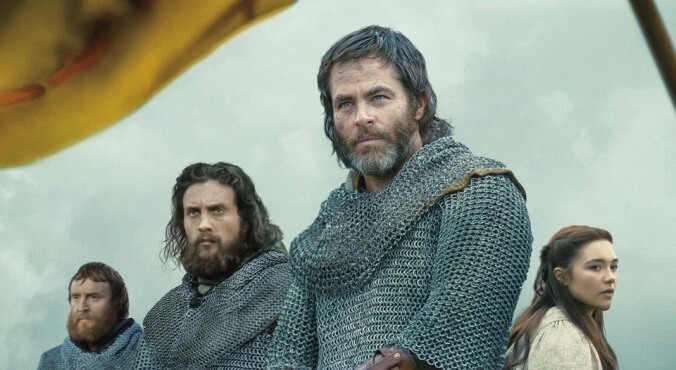Chris Pine plays a Scottish Outlaw King in an epic without a sense of purpose

“We have a spectacle,” announces King Edward (Stephen Dillane) in the middle of both an England-Scotland peace brokering and a long, circling-camera take that opens Outlaw King. This exposition-heavy early scene, which includes in its unbroken shot Robert The Bruce (Chris Pine) sword-dueling with an opponent who quizzes him on Scottish freedom fighter William Wallace, is arguably the showiest in the movie—an unusual quality for a historical war epic. Outlaw King (or, as it’s styled by the opening credits, Outlaw/King) has a more ambitious scale than other work from director David Mackenzie, even his high-profile Oscar nominee Hell Or High Water, but it’s scrappier and quieter than Braveheart, the movie it semi-sequelizes.
Braveheart mythologized the 13th-century efforts of William Wallace in the First War Of Scottish Independence, while Outlaw King takes place in the immediate aftermath, with Wallace briefly in hiding before he’s captured and killed off screen. In that elaborate opening sequence, King Edward is soliciting loyalty pledges from various nobles, including Robert, who wants to end the recent bloodshed. But it’s a brisk half-hour or so from a Scottish surrender to pledges of “Robert, I am with you,” as he becomes king of the Scots—“people, not land,” he clarifies—and leads them in another rebellion against their English would-be ruler.
Robert The Bruce was a character in Mel Gibson’s Wallace picture, appearing as something of a compromised foil to the hero. Mackenzie, in turn, makes Robert the hero here, though his enemies—the King and his son, also Edward (Billy Howle)—aren’t treated with any more nuance than in Gibson’s telling. They’re mostly sniveling and/or seething, putting their full faith in cruelty as they attempt to quash another rebellion. Because the movie hinges on the Scots realizing that they will have to fight sneakier and dirtier than they’ve anticipated, the movie also vaguely resembles another Gibson starrer, The Patriot, albeit grounded with Mackenzie’s unobtrusive sense of craft. The battles here come on suddenly, without pageantry or, save one scene toward the end, much speechifying, and their brutality shows off the latest advances in blood-mist technology (much more convincing, at least, than computer-generated splatter).
Pine, too, is unobtrusive—almost to the point of recessiveness. It’s novel to see a warrior king portrayed with a certain sensitivity, especially in the scenes between Robert and Elizabeth (Florence Pugh), partners in a marriage (his second) hastily arranged by King Edward. Mackenzie, Pine, and Pugh do a fine job generating tension in their early scene—not from conflict, but rather a tentative, slightly wary respectfulness that might bloom into something more. The first two scenes where they appear alone together end with Pine exiting the frame, yet the explicit sex scene they share not long after doesn’t feel rushed. At the same time, it feels a little perverse to cast a potentially megawatt star like Pine, used to such great effect in Mackenzie’s last film, and have him spend most of the movie tamping down his charisma.
Ultimately, it’s not a performance problem (it’s hard to fault any movie that gets such engaging work out of the often-blank Aaron Taylor-Johnson, here a feral delight as one of Scotland’s best, bloodiest brawlers) so much as Outlaw King lacks a strong center. The film moves along at a decent clip, its two-hour runtime substantially scaled back from a longer version that premiered at the Toronto International Film Festival two months ago. The heroes are noble but believable, the villains appropriately loathsome, and the violent clashes, particularly a turning-point castle infiltration, are exciting without indulging in a Gibson-style wallow in torture and gore. But the moments of offbeat personality that animate Mackenzie’s best work are fewer and farther between, leaving just scraps, as when he abruptly cuts off swelling romantic-reunion music for a well-timed slap. Even that show-off single take at the front of the movie gives way to well-chosen but more workmanlike battlefield imagery, and a lingering question about what drew the director to this material in particular. For a historical epic that probably looks even better on the big screen, it’s oddly well-suited to Netflix: spectacle, yes, but nothing too specific about it.